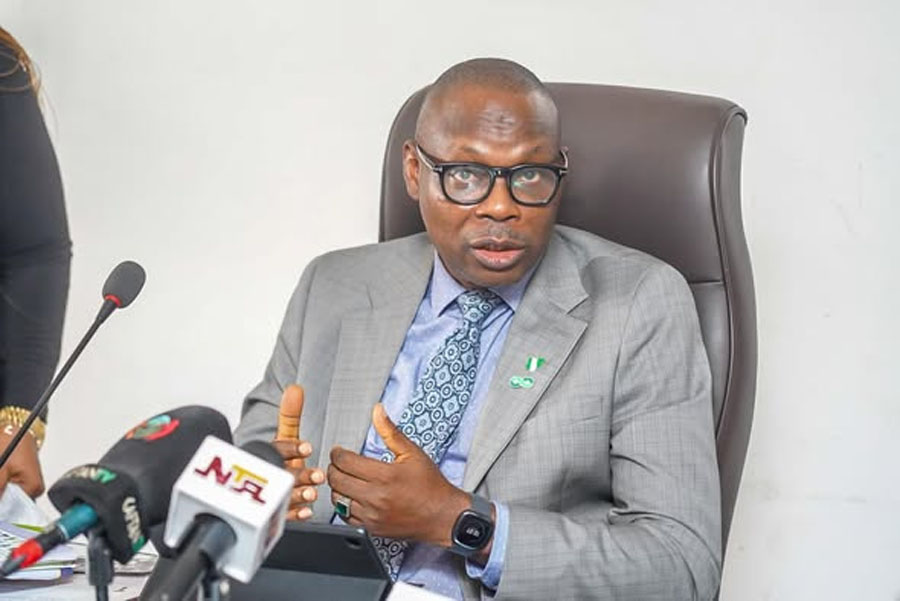Health
FG directs states to halt vaccination halfway

-Bauchi, Benue comply as AstraZeneca vaccine shortage looms
-Remaining doses will be reserved for second jabs – Minister
The Federal Government has asked all the states administering the COVID-19 vaccine to stop the exercise the moment they use half of the doses allocated to them.
The National Primary Health Care Development Agency, Dr Faisal Shuaibu, asked all the states to suspend vaccination when they reach half of the doses delivered to them.
This implies that a state that was given 100,000 doses would have to halt the vaccine rollout once the doses hit 50,000 in order for those who have received their first jab to be able to complete their vaccination.
The move, it was learnt, had become necessary due to a possible delay in the supply of the next batch of the AstraZeneca vaccines, which could affect the availability of the vaccine for a second jab for those who have taken the first.
The shortage of the AstraZeneca vaccine in the international market is caused by a surge in the demand by the European Union and a new policy by India which manufactures the vaccine. India had said last week that it would prioritise domestic vaccination for its over 1.2 billion citizens, thereby causing a shortage in developing nations like Nigeria.
Confirming the development to one of our correspondents who made an enquiry on the matter, the Minister of State for Health, Dr Olorunnimbe Mamora, said states were asked to stop vaccination halfway until more vaccines arrive because it was the smartest thing to do since it is a double-dose vaccine.
Mamora said, “On the issue of stopping at half doses, we thought this is what wisdom dictates because in a situation where we seem to be in short supply, it stands to good reason to ensure that those who have had their first dose should be given the opportunity of having the second dose.
“It is better to have a pool of people who have received full vaccination rather than just do it halfway for everybody, which I think would not be the best in the circumstance. And you are not really covered if you have your full dosage.”
When asked when Nigerians should expect more vaccines, Mamora said he could not say because it is currently a ‘sellers’ market’.
He, however, said Nigeria was already having talks with other parties including Russia, which is producing the Sputnik V vaccine.
The minister stated, “The truth is there is a challenge. However, we are not hopeless. The COVAX facility is not the only one we rely on. There is also AVATT, the regional facility which is the African Vaccine Acquisition Task Team. So, we definitely will be looking to AVATT to help increase the initial allocation in the circumstances with what is happening vis-a-vis production and supply from India.
“Both AVATT and COVAX are multilateral facilitators, but we also have bilateral negotiations. For example, the Sputnik is bilateral in the sense that it is government to government. Sputnik is Russian and as soon as we have the dossier and approval from NAFDAC, then we will consider it.”
Mamora stated that the Federal Government might have to increase its budget for vaccines since AstraZeneca, which is the cheapest in the market, is not readily available.
He said, “One of the reasons we settled for AstraZeneca is not just because it is cheap but is as good as the others. They are giving it out at cost value. The challenge is that the initial element in terms of cost projection would have to increase because AstraZeneca is the cheapest. So, we may have to reconsider our initial cost projection. That is the challenge I see.”
The Federal Government had received 3.9 million doses of the AstraZeneca vaccines through COVAX, a global initiative co-led by the Global Vaccine Alliance, Coalition for Epidemic Preparedness Innovations and World Health Organisation. The initiative was designed to ensure fair and equitable access for every country.
The vaccine arrived in Nigeria on March 2, 2021 while in the second week of March the government began distribution to states, except Kogi, whose governor, Yahaya Bello, had described COVID-19 as glorified malaria.
Persons who opt for AstraZeneca vaccines must take two doses which are usually administered at least two months apart. It was learnt that Ekiti, Bauchi and Kwara states had already administered half of their vaccine supply and had complied with the government’s directive to halt further roll-out.
Meanwhile, the Chairman, Bauchi State Primary Health Care Development Agency and Contacts and Surveillance Sub-Committee Chairman, Bauchi State Task Force on COVID-19, Dr Rilwan Mohammed, told Sunday PUNCH that the Executive Director, NPHCDA, Dr Faisal Shuaibu, wrote to Commissioners for Health in the states to suspend vaccination so that people who had received the first jab could get the second one.
Mohammed stated that Bauchi State was given 89,570 doses but had to stop administering the vaccines immediately after it received the letter having administered about half already. “We have 32,000 coverage but the call-up data is actually 41,000 just that we are still uploading to the national site because of network problems,” he added.
He stated, “There is a shortage of supply of the COVID-19 vaccine, and the Executive Director of the National Primary Health Care Development Agency, Dr Faisal Shuaibu, wrote to all the states that we should suspend vaccination when we reach half of the doses we got.
“The Federal Government realised that within eight to 12 weeks, you must be able to give the second dose but if there is no second dose to give, that means we have wasted the first dose, so they told us to stop if we have reached halfway.
“There is a crisis in the AstraZeneca production. India is having COVID-19 mutation in their country, so they decided to allocate more doses to themselves before exporting it. Secondly, the European Union which initially claimed that the vaccine had some issues has now come back after they found out that the vaccine is okay and they had made a forward request.”
Nevertheless, he explained that the state had set aside a small portion of the vaccine for intending pilgrims because vaccination had become a requirement for those visiting holy cities.
He added, “There are 4,000 Muslim pilgrims, meaning we would need 8,000 doses for them, while there are 170 Christian pilgrims, meaning we would need 340 doses for them, including their staff.
“We have a complaint from the Hajj and Christian commissions and Jerusalem and Saudi authorities have given an order that all those coming for pilgrimage and their staff must show evidence of COVID-19 test and vaccination (first and second doses).”
He said he would write to the Executive Director of NPHCDA to request for vaccines to be administered on the pilgrims.
Mohammed said there had only been 145 reactions – mostly mild – out of the tens of thousands vaccinated in the state so far, noting that the rule that sick persons should not be vaccinated had saved the state from controversies.
He added, “We have only 145 reactions due to COVID-19 vaccine and most of them are mild. Somebody went to our vaccination post in Darazo but unfortunately he was ill, so we told him that one of the conditions was that if you were sick we wouldn’t be able to give you a vaccine. The next day, he died. If we had allowed him to be vaccinated, people would say it was due to COVID-19 vaccination.”
He ruled out the possibility of the state going to look for a vaccine on its own, noting that it was best to use the one already certified by NAFDAC and that there was already a strategic plan for vaccination roll-out in the country.
Asked when the vaccination would resume, he said they had been told to start administering the second dose from May 24 because the vaccine would expire in June, since every batch has its expiry date.
Benue stops vaccination
Meanwhile, the Benue State Government says it has suspended the vaccination exercise, in line with the caution from the Executive Director, NPHCDA.
The state Commissioner for Health, Dr Joseph Ngbea, told one of our correspondents on the telephone on Friday that the state had stopped vaccination, though it did not make a formal announcement.
Ngbea said, “Yes, we have stopped the vaccination of people but we did not announce it, although there are a few people looking to be vaccinated. For example, on Thursday, we still vaccinated one of the former governors of the state who demanded for it. Unlike when we were encouraging people to come out and take the vaccine, we have stopped that.
“We had a meeting with the Executive Director of National Primary Health Care Development Agency who cautioned us to stop giving out the vaccine because of the Indian ban on export of the vaccine.”
Health
NUFBTE Workers Occupy NAFDAC Lagos Office Over Sachet Alcohol Ban

NUFBTE Workers Occupy NAFDAC Lagos Office Over Sachet Alcohol Ban
Members of the National Union of Food, Beverage and Tobacco Employees (NUFBTE) on Thursday staged a protest at the NAFDAC office in Isolo, Lagos, demanding the reversal of the agency’s ban on sachet and PET-bottled alcoholic beverages. The union claims the ban contradicts a directive reportedly issued by the Federal Government, and they want production lines that were sealed to be immediately reopened.
The protesters, including manufacturers, distributors, and industry workers, argued that the enforcement of the ban threatens jobs, livelihoods, and the operations of small and medium-sized enterprises that rely on sachet alcohol sales. During the demonstration, union members handed a petition to NAFDAC officials, urging dialogue and a more balanced approach that safeguards both public health and the food and beverage sector.
NUFBTE cited alleged instructions from the Office of the Secretary to the Government of the Federation and the Office of the National Security Adviser, claiming that NAFDAC should suspend enforcement. The union said continued closure of production lines and restriction of alcohol sales would lead to economic hardship and widespread job losses.
READ ALSO:
- Naira Could Trade Below ₦1,000/$ With Dangote Refinery at Full Capacity — Otedola
- Adeyanju Urges EFCC, DSS to Probe El-Rufai Over Alleged Corruption, Insecurity in Kaduna
- Granite-Laden Truck Kills Motorist, Leaves Wife Critically Injured in Lekki–Ajah Crash
However, NAFDAC rejected the claims, with Director-General Prof. Mojisola Adeyeye stating that no federal directive has instructed the agency to halt the ban. In a statement, the regulator described circulating reports as “false” and “misleading,” emphasizing that its actions are within statutory authority and in line with official government policies.
“NAFDAC has not received any formal directive to suspend its regulatory or enforcement activities concerning sachet alcohol,” the statement read. The agency reiterated its commitment to public health protection, regulatory compliance, and consumer safety, warning the public and industry stakeholders to rely on verified information from official channels.
The ban, implemented earlier this month, targets alcoholic beverages packaged in sachets and containers smaller than 200ml, a measure aimed at reducing unregulated alcohol consumption and protecting vulnerable groups. While the policy has faced backlash from workers and businesses, NAFDAC maintains that it is necessary for national health and safety.
The protest underscores the tension between regulatory enforcement and economic concerns, as workers continue to call for inclusive policymaking and engagement with industry stakeholders to mitigate the impact on jobs and local businesses.
NUFBTE Workers Occupy NAFDAC Lagos Office Over Sachet Alcohol Ban
Health
NAFDAC Clarifies: No Government Directive to Halt Sachet Alcohol Enforcement

NAFDAC Clarifies: No Government Directive to Halt Sachet Alcohol Enforcement
The National Agency for Food and Drug Administration and Control (NAFDAC) has dismissed reports claiming that the Federal Government ordered a suspension of its enforcement activities against sachet alcohol and 200ml PET bottle alcoholic beverages, describing the reports as “false and misleading.”
In a statement signed by its Director-General, Prof. Mojisola Adeyeye, the agency clarified that it has not received any formal communication from the Federal Government instructing it to halt regulatory or enforcement operations. NAFDAC stressed that all its actions are carried out within its statutory mandate and guided by existing laws and official government directives.
“The said publication is false, misleading, and does not reflect any official communication received by the Agency from the Federal Government,” the statement read. Prof. Adeyeye reiterated that enforcement of regulations on sachet alcohol remains active and any changes to national regulatory policies would be officially communicated through authorised channels.
READ ALSO:
- Suspected IED Explosion Rocks Bayelsa Secretariat, Police Arrest Suspect
- Regina Daniels Shares Emotional Message on Children’s Welfare Amid Custody Battle
- Electricity Workers Serve 21-Day Nationwide Strike Notice to FG
NAFDAC warned that the spread of unverified information can cause public confusion, economic uncertainty, and misinterpretation of government policy. The agency urged the public, industry stakeholders, and the media to rely only on verified information released via its official platforms and government communication channels.
The clarification comes amid ongoing concerns over the public health risks of sachet alcohol, which has been associated with poisoning incidents and misuse, particularly among young people. NAFDAC reiterated its commitment to protecting public health, ensuring compliance in the food and beverage sector, and maintaining national interest while carrying out its regulatory duties.
The agency’s statement underscores that all enforcement operations targeting unsafe alcohol products will continue without interruption, aiming to safeguard consumers and uphold public safety.
NAFDAC Clarifies: No Government Directive to Halt Sachet Alcohol Enforcement
Health
FG Ends ‘No Work, No Pay’, Clears January Salaries After 84-Day JOHESU Strike

FG Ends ‘No Work, No Pay’, Clears January Salaries After 84-Day JOHESU Strike
The Federal Government has officially lifted the “No Work, No Pay” directive imposed during the 84-day nationwide strike by the Joint Health Sector Unions (JOHESU) and approved the immediate payment of January 2026 salaries for all affected health workers.
The decision followed the suspension of the industrial action after a successful conciliation meeting between the Federal Government and JOHESU leadership, prompting the union to direct its members nationwide to resume work in the interest of patients, health system stability, and national public health security.
In a statement issued by the Assistant Director, Press and Public Relations of the Federal Ministry of Health and Social Welfare, Ado Bako, the Minister of State for Health, Dr. Iziaq Adekunle Salako, said the resolution reflects the government’s commitment to dialogue, fairness, and the protection of Nigeria’s health workforce.
READ ALSO:
- Former NAHCON Chief Explains Why He Stepped Down, Denies Conflicts
- Fubara Reaffirms Commitment to Wike’s Vision
- Housing Crisis: ₦1.5m Rent vs ₦70k Minimum Wage Sparks Outcry in Nigeria
“The Federal Government remains fully committed to the welfare, dignity, and professional advancement of all health workers across Nigeria. This resolution demonstrates that dialogue, mutual respect, and good faith remain the most effective tools for resolving industrial disputes in our health sector,” Salako said.
The minister acknowledged the sacrifices made by health workers during the prolonged strike and assured JOHESU members that no worker would be victimised, sanctioned, or intimidated for participating in the action.
“Government has therefore approved the immediate payment of January 2026 salaries and assures all JOHESU members that no reprisal will follow the industrial action,” he added.
Salako further reaffirmed the administration’s commitment to sustained engagement with health sector unions, noting that discussions would continue on the Collective Bargaining Agreement (CBA) and outstanding issues relating to the adjustment of the Consolidated Health Salary Structure (CONHESS).
He disclosed that the Federal Government has committed to making provisions for the proposed salary adjustments in the 2026 Appropriation Act, in line with the recommendations of the existing technical committee template.
“The inclusion of salary adjustment provisions in the 2026 budget framework reflects our seriousness about achieving sustainable solutions for the health workforce through concrete policy and budgetary actions,” the minister stated.
He commended the spirit of cooperation and patriotism displayed by all parties throughout the negotiation process and reassured Nigerians of the government’s commitment to uninterrupted, quality, and accessible healthcare services nationwide.
FG Ends ‘No Work, No Pay’, Clears January Salaries After 84-Day JOHESU Strike
-

 metro3 days ago
metro3 days agoIKEDC Sets Feb 20 Deadline for Customers to Submit Valid IDs or Face Disconnection
-

 Education3 days ago
Education3 days agoSupreme Court Affirms Muslim Students’ Right to Worship at Rivers State University
-

 metro2 days ago
metro2 days agoLagos Police Launch Manhunt for Suspect in Brutal Ajah Murder
-

 News2 days ago
News2 days agoAso Rock Goes Solar as Tinubu Orders National Grid Disconnection
-

 Business3 days ago
Business3 days agoNaira Could Trade Below ₦1,000/$ With Dangote Refinery at Full Capacity — Otedola
-

 metro3 days ago
metro3 days agoArmy University Professor Dies in Boko Haram Captivity After Nearly One Year
-

 Politics3 days ago
Politics3 days agoCity Boy Movement Receives Bus Donations from Zenco, Obi Cubana for Tinubu’s Campaign
-

 International3 days ago
International3 days agoTrump Halts Minnesota Immigration Crackdown After Fatal Shootings, Protests













